Unity the key as Shijiazhuang battles virus
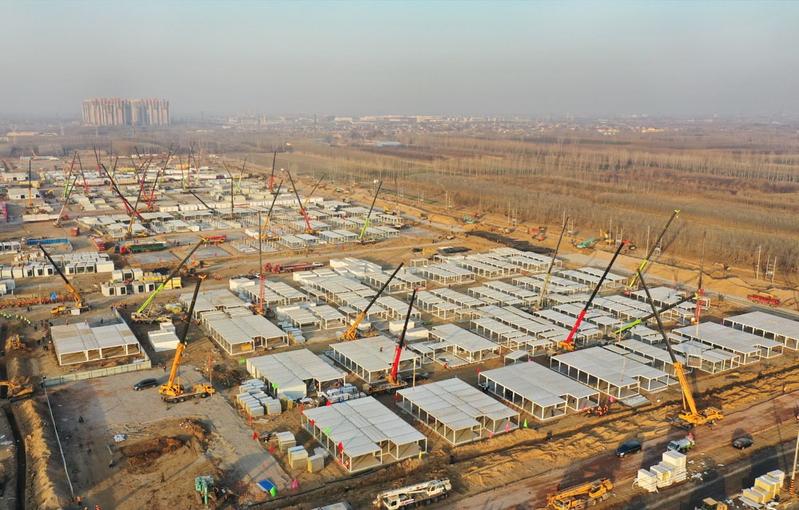 Prefabricated apartment rooms take shape at the quarantine center in Shijiazhuang. (YANG SHIYAO / XINHUA)
Prefabricated apartment rooms take shape at the quarantine center in Shijiazhuang. (YANG SHIYAO / XINHUA)
After two consecutive weeks of double-digit rises in the number of COVID-19 cases in Shijiazhuang, Hebei province, two different stories have emerged in the city.
In the first, the streets of the provincial capital, which has a population of 11 million, have been left eerily deserted by a sweeping stay-at-home order that has been extended twice in the past two weeks and was due to end on Tuesday night.
I have no fear of the virus. I just hope it will go away after all our efforts
Hua Lingchao, construction worker called in to help assemble prefabricated rooms at a centralized quarantine facility in Zhengding county, Shijiazhuang
The second story tells of bustling activities in local communities as residents unite to help one another.
On Jan 7, the city's Vice-Mayor Meng Xianghong announced a ban on outbound travel in the run-up to Spring Festival next month.
The order has left the waiting room at Shijiazhuang Railway Station, a major transportation hub in North China, almost empty.
This sprawling area is usually full of jostling crowds at this time of year as millions of people begin traveling to family homes in what sociologists have dubbed the "greatest annual human migration on Earth".
In March 2019, a local newspaper reported that the station had safely handled 4.7 million rail trips during the 40-day travel peak straddling the Spring Festival celebrations.
The lockdown was imposed in Shijiazhuang as local authorities raced to roll out the first round of citywide nucleic acid testing as part of broader efforts to detect infections for earlier isolation and treatment.
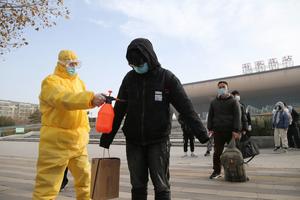 A worker disinfects passengers at Shijiazhuang Railway Station, Hebei province. (WANG ZHUANGFEI / CHINA DAILY)
A worker disinfects passengers at Shijiazhuang Railway Station, Hebei province. (WANG ZHUANGFEI / CHINA DAILY)
Just two days later, travel by subway, bus, taxi and car-hailing services was halted as the number of cases continued to rise, later prompting the authorities to launch another round of testing for all city residents.
Only a few private cars, for which government permits were issued, could be seen on the roads.
At a news conference on Jan 12, Gao Weili, an epidemiologist at the city's Center for Disease Control and Prevention, advised people to keep warm as they waited to be tested in what is usually the coldest month of the year locally.
Despite the inconvenience caused by the lockdown, people see it as a necessary step to avoid a resurgence of COVID-19 cases.
Shopping malls, theaters, museums and other facilities have been shuttered across the city, with the exception of pharmacies selling medications, and whose staff members wear full protective gear.
The small number of hotels authorized to remain open have started to demand a recent negative nucleic acid test result from guests.
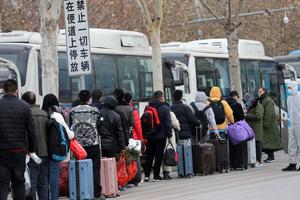 Arrivals in the city need to show a negative nucleic acid test result. (WANG ZHUANGFEI / CHINA DAILY)
Arrivals in the city need to show a negative nucleic acid test result. (WANG ZHUANGFEI / CHINA DAILY)
However, a closer look at people's lives in local communities reveals another story-one of mutual help.
Wu Gaoyuan, an English-language teacher at a local college, who is undergoing home quarantine with her husband, 4-month-old son and her parents-in-law, said she is living in isolation but does not feel cut off.
Her family was placed under strict quarantine for 21 days after her husband returned from his family home in the city's Gaocheng district, where the province's first confirmed case of COVID-19 was detected on Jan 2.
"We have a paper seal on our door," the young mother said.
Instead of becoming frustrated, the 27-year-old praised the unity in her neighborhood. She said this is largely due to the community workers and volunteers shuttling between families, grocery stores and pharmacies in an attempt to hold the area together during a challenging time.
"They do all the registration work so that we can go downstairs in different batches to get a throat swab, avoiding cross-infection," Wu said.
"Shijiazhuang people tend to stick together during the hard times," she added.
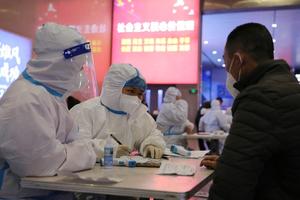 Arrivals in the city need to show a negative nucleic acid test result. (WANG ZHUANGFEI / CHINA DAILY)
Arrivals in the city need to show a negative nucleic acid test result. (WANG ZHUANGFEI / CHINA DAILY)
Direct contribution
Meanwhile, at a construction site in Zhengding county, Shijiazhuang, Hua Lingchao squatted beside a partly built apartment room, using one hand to eat a takeout meal.
That morning, he and his colleagues had assembled a number of prefabricated rooms at a centralized quarantine center being built for those with a higher risk of infection, such as close contacts of COVID-19 patients in Hebei and secondary close contacts.
Hua was sent to the area on Thursday. He had been working on a residential building project in downtown Shijiazhuang, but operations at that site were suspended due to the COVID-19 outbreak in the city.
"I'm so glad I can take part in constructing these rooms, as this enables me to contribute directly to the fight against the disease," Hua said.
The 34-year-old said he had had enough of being cooped up and lying on the bed in his dormitory for the past 10 days, adding, "It was so boring. I'd rather do some work."
He also said he had used up his 40-gigabyte data package for surfing the internet on his phone.
Wearing a white safety helmet, gray coat and dark trousers, Hua appeared unworried by the dust covering his clothes, the cold weather and the urgency of his work.
"I have no fear of the virus. I just hope it will go away after all our efforts," he said.
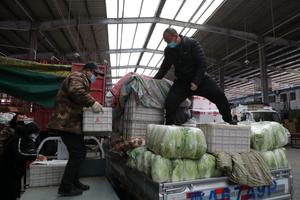 Vegetables arrive at a market in the city. (WANG ZHUANGFEI / CHINA DAILY)
Vegetables arrive at a market in the city. (WANG ZHUANGFEI / CHINA DAILY)
Along with Hua, thousands of workers from different companies have been brought to the area to build the quarantine facility, which is taking shape rapidly and will comprise more than 4,000 apartment rooms, each occupying 18 square meters. Construction started on Jan 13, and over 1,000 rooms have been completed.
Hua, who has a 13-year-old daughter and 11-year-old son, talked happily with his colleagues during lunch, telling them that his children expected him to return home soon.
"They are hoping I can come home and reunite with them for Spring Festival," he said, adding that he had left his home in Quzhou county, Handan city, Hebei, for nearly six months.
After watching a video of the construction work at the site for the quarantine center, Sina Weibo user "Shenqi", posted: "All the constructors have worked so hard. I salute them. You can make it, Hebei. With the efforts of everyone involved, success is not far away."
Freezing temperatures
In Taitou village, Shijiazhuang, middle-aged volunteers take turns to stand guard in freezing temperatures at the entrance to the neighborhood, preventing people from entering or leaving during the lockdown. They also ensure food and medicines are available in sufficient quantities for those undergoing home quarantine.
Sometimes, elderly residents take on these voluntary duties.
Liu Dongsheng, chairman of the village old people's association, which organizes the volunteers, said, "These posts cannot be unmanned."
At quieter-than-usual Shijiazhuang Railway Station, tens of thousands of travelers-mostly homebound migrant workers and college students-continue to arrive in the city every day.
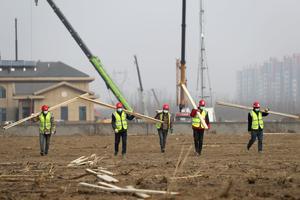 Workers carry wooden supports at a quarantine center being built in Zhengding county, Shijiazhuang. (WANG ZHUANGFEI / CHINA DAILY)
Workers carry wooden supports at a quarantine center being built in Zhengding county, Shijiazhuang. (WANG ZHUANGFEI / CHINA DAILY)
With public transportation services suspended, free chartered buses are available.
Civil affairs authorities are also standing by to provide temporary shelter to those returning to the city's Gaocheng district, where strict controls are in place.
Zhang Zhenshu, 51, who has worked for a year at a construction site in neighboring Shanxi province, said: "I heard about the bus service through a WeChat group, where my fellow villagers exchange virus-related information. I had been worried about transportation before hearing about the service."
Medical aid workers continue to arrive in Shijiazhuang from Shaanxi and Jiangsu provinces to help with contact tracing and testing.
Donations of medical equipment worth tens of millions of yuan, including thermometer guns and surgical masks, have arrived at local hospitals, reminding the city's residents that they have not been forgotten.
Firefighters wearing hazmat suits ensure that food supplies are delivered promptly to people undergoing centralized quarantine at a hotel.
One morning, a man in his 40s wearing a face mask knocked on the glass door at the hotel to attract the attention of those on duty.
"My sister is in room 401. Please hand this stuff over to her," he said, leaving two bags of snacks on the floor.
He added, "Thank you, comrades, for your dedication and courage."
Contact the writers at lilei@chinadaily.com.cn


